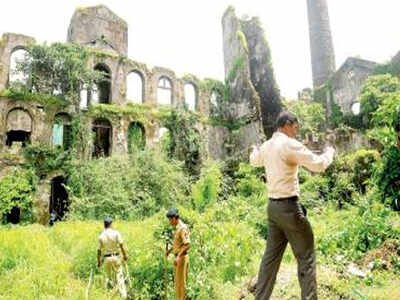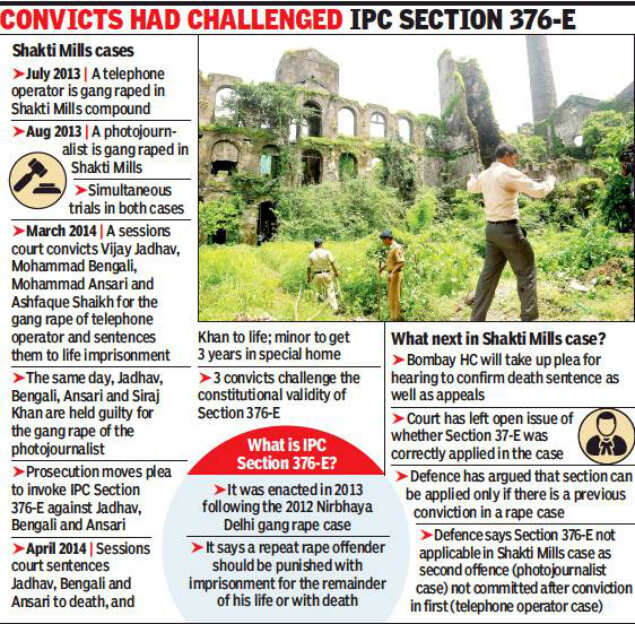
MUMBAI: The Bombay high court on Monday upheld the constitutional validity of the Indian Penal Code Section 376-E that punishes a repeat offence of rape with imprisonment for entire life or with a death penalty.

A division bench of Justice Bhushan Dharmadhikari and Justice Revati Dere dismissed the petitions filed by three death row convicts in the 2013 Shakti Mills gangrape case; they had challenged the law that was introduced after the Nirbhaya case.
“Rape is a highly reprehensible crime and demonstrates a total contempt for the personal integrity and autonomy of the victim. It is an ultimate violation of the self right to live with dignity. The effect of rape can even have disastrous consequences. For example, it can leave the person in a vegetative state, can compel her to commit suicide, and can have lifelong impact on her mental and emotional psyche. Needless to state, the stigma that is attached to rape victims is lifelong. In a sense, the offence of rape can be said to be graver than that of murder,” said Justice Dere who wrote the judgment for the bench.
The court rejected the contention that Section 376-E creates a new category of punishment or takes away the power of remission or that it prescribes a mandatory death punishment for a repeat rape offence. The bench pointed out that law provides for either life imprisonment or death and leaves the punishment to the discretion of the court. “The enhanced punishment prescribed under Section 376-E for repeat offence is imprisonment for remainder of one’s life or death, the object being to send a strong signal to the accused persons not to indulge in the offence of rape. Repeat rape is to be viewed more seriously and, therefore, a more stringent punishment is prescribed,” said the high court, adding, “convicts lose their liberty under Article 21 to a certain extent and the one who has committed a heinous offence of rape or has repeated it, cannot be allowed to put his life before the lifelong plight of the survivor.”
The bench, though, left open the issue of whether Section 376-E was correctly applied in the case.
Advocate Yug Chaudhry, counsel for the accused, had argued that the provision could be applied only when there is a previous conviction before the second offence. “We, in these petitions, do not think it necessary to deal with the issue (that there has to be an interval between previous conviction and subsequent offence,” said the bench, adding that this argument could be raised in the petition seeking confirmation of the death sentence and appeals filed by the convicts.
In April 2014, a sessions court had convicted Vijay Jadhav (19), Mohammad Kasim Bengali (21), Mohammad Salim Ansari (28) and Siraj Khan (21) for raping a photojournalist in the Shakti Mills on August 22, 2013. Jadhav, Bengali and Ansari were sentenced to death as they were earlier also convicted for the gang rape of another girl in July 2013. Siraj was sentenced to life imprisonment.
Advocate general Ashutosh Kumbhakoni and additional solicitor general Anil Singh had supported the law saying it was necessary as a deterrence and to tackle the rising incidents of rape cases in the country. Amicus curiae Abad Ponda had contended that while section 376 E was constitutionally valid, it could not have been applied in the Shakti Mills gang rape case.

A division bench of Justice Bhushan Dharmadhikari and Justice Revati Dere dismissed the petitions filed by three death row convicts in the 2013 Shakti Mills gangrape case; they had challenged the law that was introduced after the Nirbhaya case.
“Rape is a highly reprehensible crime and demonstrates a total contempt for the personal integrity and autonomy of the victim. It is an ultimate violation of the self right to live with dignity. The effect of rape can even have disastrous consequences. For example, it can leave the person in a vegetative state, can compel her to commit suicide, and can have lifelong impact on her mental and emotional psyche. Needless to state, the stigma that is attached to rape victims is lifelong. In a sense, the offence of rape can be said to be graver than that of murder,” said Justice Dere who wrote the judgment for the bench.
The court rejected the contention that Section 376-E creates a new category of punishment or takes away the power of remission or that it prescribes a mandatory death punishment for a repeat rape offence. The bench pointed out that law provides for either life imprisonment or death and leaves the punishment to the discretion of the court. “The enhanced punishment prescribed under Section 376-E for repeat offence is imprisonment for remainder of one’s life or death, the object being to send a strong signal to the accused persons not to indulge in the offence of rape. Repeat rape is to be viewed more seriously and, therefore, a more stringent punishment is prescribed,” said the high court, adding, “convicts lose their liberty under Article 21 to a certain extent and the one who has committed a heinous offence of rape or has repeated it, cannot be allowed to put his life before the lifelong plight of the survivor.”
The bench, though, left open the issue of whether Section 376-E was correctly applied in the case.
Advocate Yug Chaudhry, counsel for the accused, had argued that the provision could be applied only when there is a previous conviction before the second offence. “We, in these petitions, do not think it necessary to deal with the issue (that there has to be an interval between previous conviction and subsequent offence,” said the bench, adding that this argument could be raised in the petition seeking confirmation of the death sentence and appeals filed by the convicts.
In April 2014, a sessions court had convicted Vijay Jadhav (19), Mohammad Kasim Bengali (21), Mohammad Salim Ansari (28) and Siraj Khan (21) for raping a photojournalist in the Shakti Mills on August 22, 2013. Jadhav, Bengali and Ansari were sentenced to death as they were earlier also convicted for the gang rape of another girl in July 2013. Siraj was sentenced to life imprisonment.
Advocate general Ashutosh Kumbhakoni and additional solicitor general Anil Singh had supported the law saying it was necessary as a deterrence and to tackle the rising incidents of rape cases in the country. Amicus curiae Abad Ponda had contended that while section 376 E was constitutionally valid, it could not have been applied in the Shakti Mills gang rape case.
World Cup 2019
Trending Topics
LATEST VIDEOS
More from TOI
Navbharat Times
Featured Today in Travel
Quick Links
Lok Sabha Election Schedule 2019Lok Sabha Election NewsDelhi Capitals teamMI team 2019Rajasthan Royals 2019RCB team 2019Maharashtra Lok Sabha ConstituenciesBJP Candidate ListBJP List 2019 TamilnaduShiv Sena List 2019AP BJP List 2019Mamata BanerjeeBJP List 2019 MaharashtraPriyanka GandhiBJP List 2019 KarnatakaAMMK Candidate List 2019BJP List 2019 WBLok Sabha Elections in Tamil NaduBSP List 2019 UPNews in TamilLok Sabha Poll 2019Satta Matka 2018PM ModiMahagathbandhanNagpur BJP Candidate ListChandrababu NaiduTamil Nadu ElectionsUrmila MatondkarNews in TeluguMadras High CourtTejashwi YadavArvind KejriwalTejasvi SuryaPawan KalyanArvind KejriwalYogi AdityanathJaya PradaSatta King 2019Srinagar encounter
Get the app









